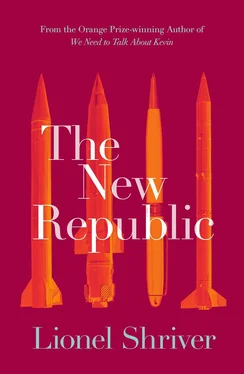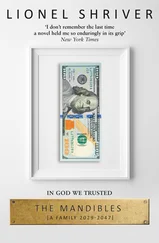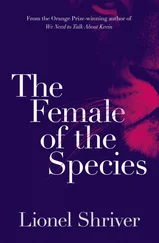“… Rich, isn’t it? That bastard has drawn slack-jawed adulation by the drool bucket—not to mention apoplectic rage. But worry is new. Must be the odd champagne glass raised in his absence, yeah? … Cer-ve-ja de puka pera? ” Wallasek pronounced with difficulty. “Sounds revolting. Thank the Lord for you brave foreign correspondents and your sacrifice for the world’s hungry need to know … Sarcastic, moi ?” Chortle-chortle. “Yeah, they don’t make nemeses like they used to, Win. Ciao.”
Edgar’s amiable grin had, he feared, slid to a grimace. His girlfriend Angela always ragged on him for slouching, and his erect I’m-just-the-man-you’re-looking-for posture in the director’s chair was hurting his back. Meanwhile, Wallasek fussed with papers on a desk that was every job applicant’s nightmare: crumpled piles doubtless dating back two presidential administrations, grease-stained with Danish crumbs. You’d never get away with a desk like that at Lee & Thole.
“So!” Wallasek exhaled, locating Edgar’s clips and CV. Their binder was missing, the photocopies disheveled. An uncomprehending gaze betrayed that Wallasek hadn’t read a paragraph of Edgar’s articles. Next time he wouldn’t bother with the color photocopying, which looked nifty but cost a buck a page. Edgar squirmed. Maybe clued-up hacks never sent color clips. The bright borders beaming from the editor’s hands looked overeager. Edgar welcomed the common charge that he was a wiseass—rude, surly, and insubordinate—but the prospect of appearing a rookie was mortifying.
He slouched.
“Mr.—Kellogg!” Wallasek exclaimed, with the same sense of discovery with which he’d looked up to find that a stranger had been sitting in his office for the last fifteen minutes. “No trouble finding the place?”
“The Equitable Building is bigger than a breadbox.” Edgar chafed at pre-interview chitchat and its artifice of relax-we-haven’t-started-yet, when empty schmooze was really one more test to pass. He had to stop himself from fast-forwarding, this summer has sure been a hot one and that’s a mighty fine wife in your desk photo there and you don’t have to ask where I live since the address is on my résumé and no I don’t want a cup of coffee.
“Can I get you—?”
“Nothing, thanks.” To encourage a cut to the chase, Edgar shot a pointed glance at his chunky gold-plated diving watch. In the context of Edgar’s current average income of $300/month, its gratuitous dials spun with a dizzying exorbitance that until this spring he’d taken for granted.
“Second in your class,” Wallasek muttered, running a finger down the CV. “Vice president … Honorable mention … Salutatorian … Second prize … Second-chair … Say, you’ve almost snagged a lot of things.”
“I’m one of life’s runners-up.” Having failed to keep the edge from his voice, Edgar moderated pleasantly, “We try harder.”
Wallasek pulled back the arm on a pair of nail clippers and stuck the end in his ear, digging for wax. “A book review for Newsday ,” he ruminated, spreading the photocopies. “The Village Voice —that’s a freebie now, isn’t it?”
“Yes, sir,” Edgar said stonily.
“ Washington Times … The Moonie paper.”
Since the early eighties the Washington Times had been owned by a fat Korean evangelist. “The staff does maintain independent editorial control.”
“Yes—or so they claim. Still, it’s not the Post , is it?”
“No, sirree,” Edgar agreed, clicking his eyeteeth, “it ain’t the Washington Post .”
“ Columbia Alumni Magazine , Amtrak Express .” Examining his nail clipper arm, the editor removed a sulfurous chunk from its tip before returning to Edgar’s fledgling journalism, none of which seemed to generate the intense fascination of the gunk from Wallasek’s ear.
“And the New Republic ,” Edgar pointed out.
“The rest of these seem to be law review. How much do you know about the National Record ?”
“I’m a regular reader,” Edgar lied; once he’d scanned for Falconer’s byline he generally tossed the rag, since its sports section sucked. “I appreciate that the Record filled a void. For this country’s only national newspaper to have remained USA Today would have been a scandal.”
Wallasek still looked expectant; Edgar hadn’t yet laid it on thick enough. “The Record also embraces America’s post–Cold War global leadership. Your international coverage is at least as thorough as the New York Times . In assuming that readers care about the rest of the world, you don’t condescend to your subscribers.” Edgar had to stop; his inflection had developed the lilt of implausible enthusiasm employed to retail panty shields.
“Of course we condescend to our subscribers,” Wallasek dismissed with a wave. “International coverage is a sop to their vanity. Only a handful read that stuff. With one exception: when our American everyman tucks the Record under one arm and trundles into a seven-forty-seven and one of those filthy little foreigners blows it up. Those articles get read, my friend. Every column inch.”
Edgar found railing against terrorists the height of tedium. The issue invited over-obvious moralizing, since who’s going to contend that wasting those two kids with a trashcan bomb in a D.C. shopping mall in April was a profound political statement? Presumably Edgar was now obliged to chime in with hearty indignation over the Soldatsies Oozhatsies , or whatever those sorry-ass crackpots called themselves, clenching his fist in we-shall-not-be-moved solidarity with his fellow Americans, who will never capitulate to terrorism . Or maybe he should small-talk about how amazing it was that the FBI hadn’t collared a single one of these dirtbags, to demonstrate that he was on top of the story. But this interview wasn’t going well, the application had been a long shot to begin with, and Edgar passed.
“You aware of how the Record managed to establish a reputation for quality journalism in so few years?” asked Wallasek.
“Astute editing, a clearly defined remit—”
“Balls,” Wallasek cut him off. “By paying better than any paper in the country.”
Edgar smiled despite himself. “I know.”
“What I’m getting at here is that, well, you’ve got a few nice clips—”
“Those are only samples, of course.”
They both knew that Edgar had furnished every semicolon he’d ever published.
“Still, Mr. Kellogg, aren’t you aiming a little high?”
“I explained in my cover letter—”
“Yes—you ‘quit the law to become a freelance journalist.’ That caught my eye.”
“I left a top Wall Street firm where I was about to make partner,” said Edgar. “Until a few months ago I was making two hundred grand a year and rising. The Record may pay well, but that well? Seems to me that, however you slice it, I’m not ‘aiming high,’ but asking for a whopping cut in salary.”
“So I should hire you because you’re nuts?”
Edgar laughed. “Or what’s the latest prissy buzz phrase? Learning-delayed. ”
Wallasek squinted. “What possessed you?”
Edgar paused. He’d rehearsed his explanation in the taxi on the way here, the cab itself an extravagance left over from the Lee & Thole days—a habit he’d have to break. Despite his designer slouch, Edgar must have been nervous; the glib rationale fled. Only overwrought snippets from college D. H. Lawrence classes flitted back to him, like “inchoate yearning.” He could not emote to some bovine newspaperman about “inchoate yearning” any more than he could assert to Toby’s own boss that he was driven to become “a Falconer.”
Читать дальше












